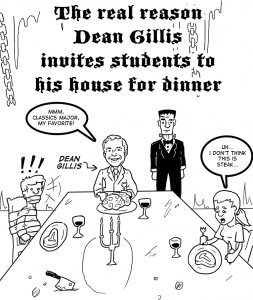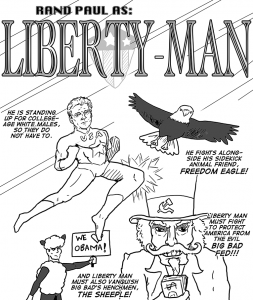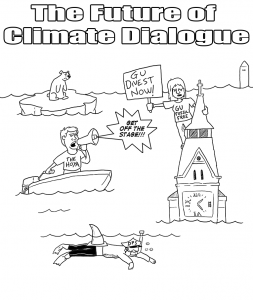“He’ll draw your picture for two bucks.” The man who announces this is squatting on an upside-down egg crate at the park’s edge. The flannel jacket he’s wearing, zipped up around his neck, seems inadequate for the Philadelphia winter. So too do his nylon cap, his torn Reeboks. He directs his petition for money at a young man passing by on his way to a meeting with a colleague over dinner. The young man —his name is William—regards the beggar as anyone might, disdainfully.
There is also a third man who seems to be with the beggar. He is propped against a parking meter, surrounded by the bleached steam that wheezes through sidewalk grates this time of year. There’s an unlikely aspect to him, a deformity conspicuous in its slightness. He looks to be 18, but William can never tell ages with such people. Sprawled next to him are his sketchpad, the shaved remains of a pencil, and a coffee can with his day’s earnings: a few coins and small bills. The traffic light is red, and William waits to cross out of the park.
It’s twilight on Market Street, and the city is veiled in the pallid gray that comes with the evening wind among granite and glass buildings lined-up before City Hall. Downtown has already unloaded itself of suits and skirts for the night, and it’s mere bad luck that William has met Sam Every’s eye and subsequent appeal for cash. It is not just the man’s appearance that disturbs him. It’s the incessant begging of his kind: there’s no excuse for it in a country that William himself immigrated to. After all, he has had a tough enough life without having to prostrate himself on a sidewalk.
“Only two bucks and he’ll draw your picture.” Every repeats the refrain.
William’s parents moved to America from the Soviet Union with their educations and not much else in ‘92. William had just turned 10. They both found jobs at a chemical company in Bristol, Pennsylvania, a blue-collar town where smokestacks rise unevenly above the trees along the Delaware River. They worked night shifts at the plant and rarely saw their son on weekdays. Now William recalls a conversation in the state-owned Moscow apartment of his childhood where his father was talking about the new country.
“You can’t expect handouts in a country like that,” his father tells him, using only English now that they are about to move. “You’ll need hard work if you don’t want to live in a place like this,” he says, sweeping his hand across their small kitchen, which doubles as a living room. William did work hard, they all did, and it paid off with dividends. He was admitted into a prominent university and, after law school, started as a junior associate at a reputable Philadelphia firm. Now, between the monthly payments on his BMW, a used one but expensive nonetheless, he even sends some money to his parents, who still live in Bristol. People take care of their own.
William usually leaves the city by train immediately after work, but tonight he has the meeting so he took a shortcut through the park grounds. The park is a comma between the commercial and arts districts. As the sun falls each night, a trickling of street people and transient-types fill its cracked, root-lifted paths and leafless squares. Like most professionals, William considers it a filthy place, and he’s glad to be through it. Still, there’s something about this beggar, sitting near the street on the park’s outskirts, that bends him the wrong way.
“Come on, only two bucks,” Every says again.
The light is green, but William doesn’t move. Instead, he looks at Sam Every. It’s bums like this —draped in their layers of rank clothing, everywhere the reek of piss and bitter alcohol, and always their lazy upbringings in families who have lived in America for so many generations—that tax his and his parents’ paychecks every other Friday. It isn’t right, and here’s one looking to take more from him.
“Two bucks for you and what for him?” William scoffs, gesturing at the strange-looking boy with the drawing pad. Just another bum trying to make a dollar, this one exploiting a poor retard.
“You don’t get it,” retorts Every. “This boy would be dead if it weren’t for my looking out for him.” He emphasizes dead in the way that a talent agent might remind a client that she’d be nothing if it weren’t for him.
A few people hurrying in the other direction are stopped at a nearby crosswalk. Noticing the confrontation, they take awkward turns glancing at the three men from their huddled distance. Ever conscious of another’s eye, William reddens. The bum is probably right about the boy, he concedes to himself. Philadelphia winters can be harsher than most places, especially for a kid who can’t take care of himself.
“Buddy, I haven’t got any cash on me anyway,” he says. He says ‘buddy’ in that thoroughly American manner, as if spat.
Every expects this line. He’s lived downtown for the past 15 years, moving in and out of this or that shelter depending on the season and getting to know the city’s people all the while. He knows the affable seminarians at Old St. Joe’s soup kitchen who hand out soup and lasagna on Saturday afternoons, and the hesitant boy scouts who bring canned fruit, granola bars and toiletries every Thanksgiving. He knows the young mothers in their mini-vans who, stopped at a red light, inch down their windows just low enough to slip him a five or a McDonald’s coupon from the glove compartment. He knows the Williams of this city, too: young, fit and well groomed, wearing the correct combinations of sunglasses and neckties, their briefcases swinging with their hurried strides. And Every knows that he has the duration of one traffic light, an appeal that stops on green, to make a dollar for his dinner and for his friend’s.
“Look guy, it’s cold and my pal here hasn’t got a chance in this weather,” he says, motioning to the boy, who has begun to draw on his sketch pad. “I can get along fine out here, but he needs some change.”
William does not expect this response, his bootstrap logic of self-sufficiency defeated by the boy’s helplessness. Embarrassed again, he diverts his eyes. But then he has an idea, and reaching his hand into his coat’s left breast pocket, he produces a silver money-clip. His initials are etched into its polished surface, which fastens a thick fold of bills. He holds the bills with his right thumb and index finger and slides the clip off with the same fingers of the other hand. The last sunlight flashes off the metal and onto Every’s forehead, and William offers him a peculiar smile. He shuffles through the money, making each bill conspicuous. After the twenties and the tens and the fives he reaches the ones. Removing the last two dollars in the pack, he unfolds the bills, bends over and stuffs them into the breast pocket of the boy’s dungaree jacket.
“He can’t help himself?” he asks Every while replacing the clip into his pocket. “Then I’ll give him the money to hold onto.”
He turns to cross the street. No money for the bum, but help the retard. A win-win situation. But then he stops, turns around again and walks back to the boy. He reaches into the pocket where he left the money: he won’t leave the bills where Every can take them after he’s gone. He removes the money.
The crowd at the corner watches this scene unfold and fails to notice the green light. A stout middle-aged woman stands staring at William and shakes her head, while a young woman with a small face and glasses—not unattractive—whispers something into her ear. The stout women snickers and William, who has forgotten about the crowd, looks over at them and then back at Every. But Every only raises his eyebrows; this guy’s on his own. A man about William’s age removes himself from the crowd. He advances on William, Every and the boy.
“Hey there, I can see you boys need some money,” he says to the two homeless men. “And I see this guy,” he tilts his head towards William, “is giving you a hard time.” Without touching Every’s skin, he drops a few coins into his hand; a few more rattle into the boy’s coffee can. The man doesn’t make eye contact with either of them and brushes past William on his way back to the crowd. A few of them greet him with affected nods, aimed more at William than the man. The young woman smiles, and they hurry across the street before the light changes.
The three of them are alone again. William shivers from perspiration, now cold on his skin, and wipes his forehead with his sleeve. He’s angry, angry at the prick who didn’t give the two bums enough change for a cup of coffee between them. Not that they deserved the money, but the people at the corner acted as if he were some sort of Samaritan. And he’s angry at that crowd, too. They kept their distance from him as much as from the homeless men, as if he were like them. He who had shed his Russian accent in grade school, who had dressed like everyone else, who had hid so carefully his own parents’ near poverty.
Then he’s sitting in fourth grade history class at Lafayette Elementary in Bristol. He doesn’t realize that he has forgotten his lunch until his mother appears in the doorway. She smiles at him and holds up a brown bag. “Darling, you forgot this.”
He doesn’t know if they laughed at her voice, or at her angular face or cheap dress. He has always remembered it that way: that they laughed because he was foreign and poor and unlike them. But perhaps they didn’t laugh at all, perhaps he remembers it only as one might recall fear felt in an unfamiliar place, without ever recalling its secret cause.
And maybe the people at the corner, watching him retrieve the money from the boy’s pocket, saw him as merely cruel, and nothing more. But it was for the boy’s own sake that he took the money: he thought Every would steal it. He wanted to buy the kid dinner instead, and that’s what he’ll do. There was a burger spot a few doors down, and he could get him a quick meal and some coffee there.
“Hey, get up, kid.” The boy keeps drawing; he doesn’t rise.
“C’mon, get up. What’s wrong with him?”
“I have no idea what’s wrong with him. He doesn’t take to people that he doesn’t know,” Every says.
“Tell him I’m going to … tell him I want to buy him dinner.”
“Tell him yourself.” Every wants nothing more to do with this man. Most people act like the tall fellow from the crowd: throw a few quarters at him and feel fine about it afterwards. But he isn’t used to people taking the time to insult him and then sticking around afterwards. “I know why you took back that money from the boy; he would have been fine buying his own —“
“—oh yeah?” William interrupts. “You know why I took that money back?”
“Yes, I do.” Every speaks deliberately. “You thought I’d take it from him and then piss it down the drain. Well, I wouldn’t have, not his share. He gets confused out here. He’ll wake in a park or in an empty warehouse when it’s cold out and expect to find his parents there with him. I don’t know where his family’s at, but I look out for him, have for a while now.”
The boy raises his eyes when Every mentions his parents. He raises them in the space between two blinks, and Every, who has been watching him, puts a hand on his wrinkled sleeve.
“Benjamin,” he says gently, “he’ll grab you a bite to eat. Go on with him, I’ll be here.”
The boy rises far larger than either of the men. He looks down, concentrates intensely on Every, and Every nods. He looks down at William, who steps away and walks towards the restaurant. Benjamin turns back to Every, then hurries after William in a half-limp.
From outside, the restaurant appears stale and greasy, but the dim yellow lamps inside are warm against the twilight. It is sparsely populated and the din of conversation drops to guarded whispers when the two men step in from the cold, one in a charcoal topcoat and leather gloves, the other in stained flannel and a dungaree jacket. Some business-types sitting by the windows, middle-aged guys with oily skin and oily hair slicked over gaping bald spots, watch them from the corners of their eyes.
Under his breath, William tells Benjamin to hurry up, but the boy stares at the faces and the tables and the man behind the counter, who’s excitedly motioning for another employee to come out of the kitchen.
“We’ll have two burgers and two cups of coffee,” William says.
The man doesn’t speak and the second employee arrives at the counter.
“What’s the deal here? I said we’ll have two burgers and two cups of coffee.”
The man from the kitchen, the words Night Manager written across his name plate, glances at William and Benjamin before addressing the other employee.
“He can’t stay here. He’ll have to leave,” he says blandly.
“That’s fine; he doesn’t care where he eats it. Two burgers and coffees to go.”
“He doesn’t get what I’m saying. The bum’s got to go.” He doesn’t look at Benjamin or William as he speaks, talking only to the other employee.
“I get it. He can’t eat here.“
“He can’t be here at all,” the manager snaps, looking at William for the first time. His deep-set eyes hover over a thick mustache, and the other employee moves his hands in and out of his pockets like a nervous child before a fight.
“Listen. I’m here with him. I’m paying for him. Just give us the food and then we’re gone.”
“If you’re with him, then you can get out as well.” The man has raised his voice and there are no more whispers among the customers. William stands there with Benjamin and notices the yellow lamps again, their bilious glance on the men at the counter and on the men at the tables. The smell from the fryers is thick in the stale air, and the night outside is a graying wall against the windows.
He’s suddenly back at the immigration desk with his parents in 1992. A man in shirt sleeves, his armpits yellowed from sweat, is talking at them too fast. William can only collect a few words: Passports? You’re in America now, check in often. He had expected warmer weather here, but it’s a wet cold when they leave the airport and his mother holds him close to her in the darkness.
Outside, the twilight has ceded to night, and Benjamin, confused by the recent scene in the restaurant, stays near William.
“Don’t worry about those guys. They’re shit, they’re all shit.” Every one of them. Every is still waiting at the corner when they return.
“I’m surprised they let you order with Benjamin in there. They usually throw us out before we reach the counter.”
“Thanks for the heads up; we didn’t get much further. Why don’t you take this, get some food with it later?” William takes the bills from his jacket again.
“I told you, I can take care of myself. But I’ll take it for the both of us.”
“That’s fine,” says William; he hands Every the bills. His cell phone is ringing.
“I lost track of the time,” he tells his colleague on the other end of the line. “I ran into some guys I used to know. I’ll be there soon.”
The opposing traffic light is yellow and William turns to cross the street before it changes. He steps away from the curb.
“Hey! Don’t you want your picture?” Benjamin shouts after him, waving the sketch pad, but William is already gone.





